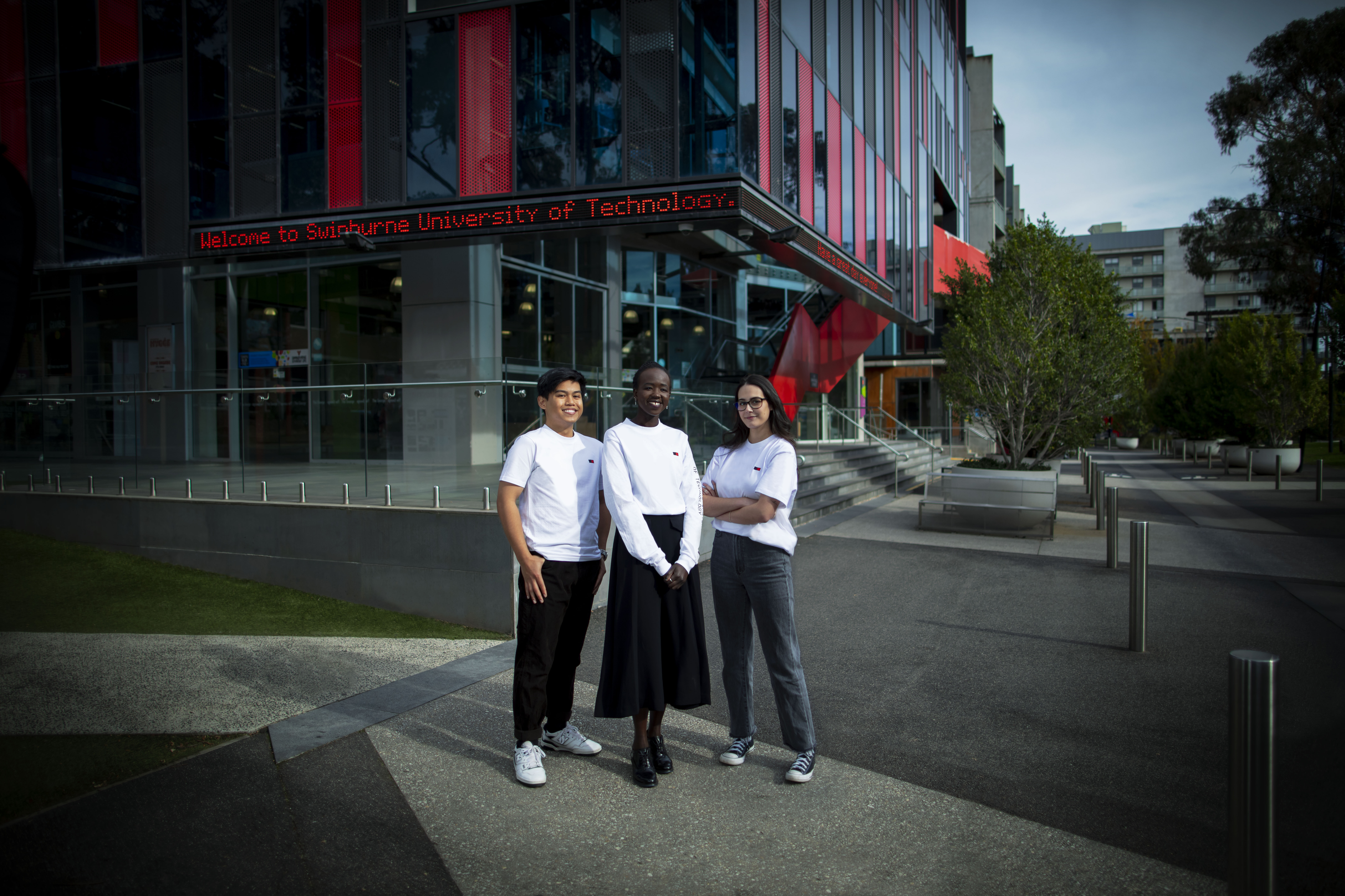6 questions to test that VTAC preferences list

Your student has questions. We've got answers. Here's some handy, straight-from-the-source advice for that pending VTAC preferences list.
Being a parent or guardian of a Year 11 or 12 student is a full-time gig. Between course requirements, ATARs, offer rounds and everything else that comes with coming of age, there’s a lot to stay on top of.
So, to make deciding what and where to study after high school that little bit easier for you and your student, we consulted students who’ve been through exactly what your student is going through right now.
Stephen is studying a Bachelor of Aviation/ Bachelor of Business at Swinburne. He’s also a street photographer, baker, and bedroom DJ (the latter is thanks to lockdown). Sohani is studying a Bachelor of Business (Professional) at Swinburne – with a major in marketing. She’s a mental health advocate and a photographer, too.
They share their top 6 questions to ask so your student can submit their preferences with confidence and excitement.
1. Will this be fun? And is it secure?
Stephen says it's important to balance your passion with security. “Consider something that you have a passion for, that you know will be enjoyable, but also that’s safe – both financially and personally.”
“Consider something that you have a passion for, that you know will be enjoyable, but also that’s safe – both financially and personally.”
After speaking with his careers adviser in Year 12, Stephen was left questioning his original choices.
“My career adviser raised the cyclical dynamics of the aviation industry with me. They said pilots are at greater risk of layoffs or redundancy due to macro trends that cause economic downturn,” he says. “I was irritated after this conversation because it left me with questions about my career choice. But after the irritation passed, I was glad I was challenged. The COVID-19 pandemic showed me that my choice to study a double degree will afford me both fun and security.”
2. How can I get real-life experience from my studies?

Newly-commencing Swinburne bachelor degree students are guaranteed real industry experience as part of their studies. From placements, internships and industry-linked projects, it all adds up to experience on the CV and helps give Swinburne graduates a competitive edge.
This one tops Sohani’s list of most important questions to ask when selecting VTAC preferences. “Studying a degree versus working in the industry is not the same! At Swinburne, you can do both. Being on placements, I get to apply the theory learned in my course to real-life scenarios in the workplace. I get the chance to test out my skills and knowledge as well as pinpoint areas of weakness that I need to invest more time in,” says Sohani.
“Getting real-industry experience as part of your studies gives you a competitive advantage at such an early stage of your career, putting you that one step further in where you want to go.”
“Getting real-industry experience as part of your studies gives you a competitive advantage at such an early stage of your career, putting you that one step further in where you want to go.”

Sohani has taken on many leadership and volunteering opportunities at Swinburne. She is the marketing lead at PixelSwin and is currently completing a professional placement with Swinburne Edge as a marketing assistant.
Stephen agrees. “University is much more than just coming in for a lecture to learn theory and doing your final assessments. At Swinburne, I’ve gained industry experience and peer mentoring through the Piers Fowler Aviation Mentorship Program in 2021 and now in the 2022 Qantas Future Pilot Program. I’ve also joined the Swinburne Aviation Society, and I’m a student ambassador. All of these experiences take my learnings to a whole new level.”
Make 2025 your year
No matter what course you’re looking at, or what level of study, we’re on hand to help you get started – with explainers, key dates, application help, and more.
3. Is there flexibility in choosing your own timetable?
Flexibility is key for Sohani.
“Being a busy person who works part-time, volunteers, values family and friend time, values ‘me-time’ and invests time in my side hustle, flexibility becomes the make or break to surviving,” she says. “In having a say in preferred times and days I want to study, I can comfortably move around my other priorities without having to drop a commitment.”
4. What’s the commute like?
/George_Building_Train_05A5719.jpg/_jcr_content/renditions/cq5dam.web.3840.2160.jpeg)
Swinburne is easily accessible by train, bus, tram and has onsite parking, too. In fact, Glenferrie station is also known as the Swinburne station.
Sohani and Stephen both spout the virtues of a convenient commute. “Considering the location of the university is important,” says Sohani. “For in-person lectures and classes, you need to be committed to attending all of them if you want to get the most out of your degree. If the commute is too long and inconvenient, then this is something to consider.”
“The campus, public transport, cafés, social venues and living in student residences all give me the warm fuzzies,” says Stephen. He finds that having everything so well-connected means there are more incidental encounters. “I often bump into people I study with. We chat, invite each other to go out, have a coffee or eat in the nearby cafés. It’s great to catch up with my friends, and it helps clear my mind for the next uni session.”
5. Can I change my studies when I’m already in deep?
“Sometimes, what you thought you wanted to study might not be what you want to continue with,” says Stephen. “Sometimes, the thought of not choosing the perfect course scares Year 12 students. I can relate because that’s exactly how I felt when I was doing my preferences. So, my advice would be – do not fret. Just because you’ve chosen your preferences, it doesn’t mean you’re forced to stick with it.”
Stephen has witnessed many friends stay at Swinburne but switch to other courses thanks to the extreme flexibility on offer at Swinburne (not every uni lets you change your major, or degree, mid-way through). So, he knows just how easy and commonplace changing your mind is. “Your professional purpose will change over time. It’s never too late to change your studies to be better aligned in satisfying your purpose.”
6. What’s the campus vibe?

Stephen (right) moving into student residences. He credits the supportive Swinburne community with making him feel accepted and inspired, and making the transition from high school to university as seamless as possible.
As with any period of transition or change in life, a strong and supportive community is so important. Your student will want a university and a course that challenges them in a positive way. But they also need a place where they will feel safe and secure to step out of their comfort zone and take measured risks that will help them grow. In order to thrive, they need a learning environment where they feel accepted, inspired and free of judgement.
“Friendly banter, laughter, support and a strong sense of belonging are all part of Swinburne’s DNA,” says Sohani. “It’s comforting to hear about other students’ stories, struggles, and passions.”
Stephen seconds Sohani’s take on the welcoming Swinburne community. “The friends I’ve made helped me adapt to the university lifestyle and living out of home for the first time.”
There you have it, six questions for your student to ask themselves before submitting their timely VTAC preferences by 5pm on 29 September.
Applications now open
Take up the space AI can't fill and make 2025 your year. Semester 1 starts on Monday 3 March.
Upcoming or past events
-
Change of Preference Expo 2024
Want more for your ATAR? Drop by Change of Preference Expo to explore your options and get personalised advice from course experts, based on your Year 12 results.
Register now (Change of Preference Expo 2024) -
Study Expo 2025
Looking to start in Semester 1? Browse Swinburne courses, study areas, and our Hawthorn campus at your own pace.
-
Course Info
- Engineering
- Science
- Information Technology
A Day in the Life of a Swinburne STEM Student
Go on a journey through the world of science, engineering and technology at Swinburne as you walk a day in a STEM student’s shoes.
Register now (A Day in the Life of a Swinburne STEM Student)
Keep on exploring
-

Year 11 & 12 Hub
-

2025 Early Entry Program
-

Why study at Swinburne?

